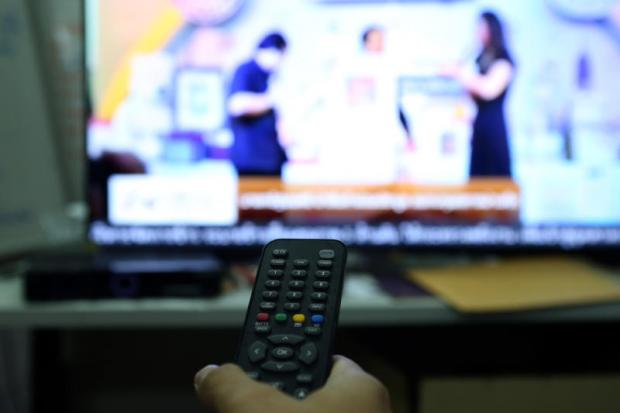
Despite growing financial constraints, digital TV operators still see it as unnecessary for the government to exercise Section 44 of the interim charter to deal with their problems.
Surachai Chetchotisak, chief executive of RS Plc, the digital TV operator of Channel 8, said he strongly opposes asking the government to invoke Section 44 to allow financially troubled digital TV operators to return their digital TV licences.
"Using Section 44 is unacceptable as every digital TV operator accepted the terms and conditions of the National Broadcasting and Telecommunications Commission [NBTC] from the outset, before investing a massive amount on both licence fees and operating costs to run the business," he said. "Everyone was ready at that time, so it's unfair now to let them renege easily."
The NBTC granted 24 digital TV channel licences to 17 winning bidders in April 2014. The winners have to pay a combined 50.9 billion baht in auction fees spread out over six years. The fourth payment was due in May this year, the fifth in May 2018 and the last in May 2019.
Mr Surachai said using Section 44 might benefit some digital TV operators, but it would harm the national interest.
He said the digital TV industry is like any other business, where there are winners and losers. If the government wants to help ease the financial burden of operators, it should offer the same help to all industries in the name of fairness.
"Many digital TV operators have found a way to survive, seeking new investors and strategic partners for help," said Mr Surachai.
Mana Treelayapewat, dean of the School of Communication Arts at the University of the Thai Chamber of Commerce, agreed with Mr Surachai, saying using Section 44 would only help digital TV operators in the short term, adding it would be unfair to only help some of them, as they knew what they were getting into before they joined the bidding.
Mr Mana said the government should think carefully and make the national interest its first priority before moving ahead with any measures to help digital TV operators.
He said all digital TV operators should have felt operational relief after Prime Minister Prayut Chan-o-cha last year exercised his power to use Section 44 of the interim constitution to extend the auction fee payment period to help them survive.
By doing so, they had a chance to improve their financial situations and produce new content.
Digital TV operators are allowed to divide their fourth payment of auction fees into two instalments a year, but they have to pay interest at a rate of 1.5% annually.
Similar payments are also allowed for the fifth and sixth instalments.
Up until now, Thai TV Co, led by media veteran Pantipa Sakulchai, had been the first digital TV operator to throw in the towel, as it faced massive losses of 1 billion baht from running two digital TV channels.
The ailing company defaulted on its second instalment of auction fees in May 2015 and stopped broadcasting the two channels in December of that year.
Saithip Montrikul na Ayudhaya, chief operating officer of GMM Grammy's GMM Media, which operates the GMM25 digital TV channel, said that the digital TV industry still needs time to settle down and during the transition period there will be both the winners and losers, just like any other business.
She said only digital TV channels with strong positioning and financial lifelines will survive in the long term.
After three years of digital TV operations, industry experts predict a clear-cut picture is emerging of those who will rise and those who will fall by the wayside.
Over the next several years, only 10 digital TV operators, based on TV viewership ratings and advertising revenue, will survive, leaving the rest struggling to stay afloat, slowly drowning from poor quality content, they said.
According to a recent study by Nielsen Thailand, the nationwide top 10 digital TV channels in June were Bangkok Broadcasting and Television Co's (BBTV) Channel 7; BEC World's Channel 3 HD; Workpoint TV; Channel 8 by RS Plc; Mono 29; GMM Grammy's ONE HD; Amarin TV HD; Thairath TV; Channel 3 SD; and satellite TV channel Boomerang.
BEC World Plc group chief executive Prachum Maleenont, is even less optimistic, predicting only 5-8 digital TV channels will survive the intense competition of the business over the next three years.
NBTC secretary-general Takorn Tantasith said last week the NBTC itself has no authority to allow the digital TV operators to return their licences, but he opined if the digital TV operators want to return their operating licences, they have to file their petitions themselves if they want the government to use Section 44.